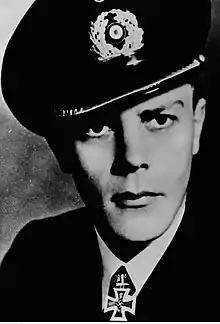Carl Emmermann | |
|---|---|
 Carl Emmermann | |
| Born | 6 March 1915 Hamburg |
| Died | 25 March 1990 (aged 75) Celle |
| Allegiance | Germany |
| Service/ | |
| Years of service | 1934–45 |
| Rank | Korvettenkapitän |
| Commands held | U-172, 5 November 1941 – 31 October 1943 U-3037, 3 March 1945 – 22 April 1945 |
| Battles/wars | Battle of the Atlantic |
| Awards | Knight's Cross with Oak Leaves |
| Other work | Engineer businessman |
Carl Emmermann (6 March 1915 – 25 March 1990) was a German U-boat commander during World War II. In his time as commander, submarines under his command sank 27 ships for a total tonnage of 152,080 gross register tons (GRT).
Career
Emmermann began his naval career in 1934. For some years he was training officer on the Naval Academy Mürwik, where future officers got their training.
In 1939 Emmermann joined the U-boat force and in November 1940 became the first Watch officer on UA under the command of Hans Eckermann. On her first patrol UA only damaged the British steamer SS Empire Attendant.
In November 1941 Emmermann took over his own boat, U-172. He completed five patrols with this boat, in the Caribbean Sea, with the wolf pack Eisbär in South African waters, and in the North and South Atlantic.
His greatest success was the 10 October 1942 sinking of the British liner-troopship SS Orcades. Emmermann sank the SS Benlomond off the coast of Brasil on 23 November 1942. His fifth patrol with U-172 was dramatic, in that the boat brought back half the crew of U-604 which had been so heavily damaged during two air attacks that she had to be scuttled. After that patrol Emmermann became the commander of the 6th U-boat Flotilla in November 1943.
In August 1944 Emmermann became the chief of the Erprobungsgruppe Typ XXIII. There in late 1944 he wrote the battle instructions for the new Type XXIII U-boat.
In March 1945 he was commander of U-3037 for one month, and in the last month of the war he commanded the 31st U-boat Flotilla in Hamburg. Along with some other U-boat men he took part in infantry duty around Hamburg as commander of Marine-Battalion Emmermann.
Emmermann survived the war and later returned to Germany, studied engineering and prospered in business.
Awards
- Wehrmacht Long Service Award 4th Class (5 April 1938)[1]
- Iron Cross (1939)
- U-boat War Badge (1939) (2 August 1941)[2]
- with Diamonds (1 October 1943)[2]
- War Merit Cross 2nd Class with Swords (1 September 1944)[2]
- U-boat Front Clasp (1 October 1944)[2]
- Knight's Cross of the Iron Cross with Oak Leaves
- Knights Cross on 27 November 1942 as Kapitänleutnant and commander of U-172[4][5]
- 256th Oak Leaves on 4 July 1943 as Kapitänleutnant and commander of U-172[4][6]
References
Citations
- ↑ Busch & Röll 2003, p. 276.
- 1 2 3 4 5 6 Busch & Röll 2003, p. 277.
- 1 2 Thomas 1997, p. 154.
- 1 2 Scherzer 2007, p. 294.
- ↑ Fellgiebel 2000, p. 172.
- ↑ Fellgiebel 2000, p. 70.
Bibliography
- Busch, Rainer; Röll, Hans-Joachim (2003). Der U-Boot-Krieg 1939–1945 – Die Ritterkreuzträger der U-Boot-Waffe von September 1939 bis Mai 1945 [The U-Boat War 1939–1945 – The Knight's Cross Bearers of the U-Boat Force from September 1939 to May 1945] (in German). Hamburg, Berlin, Bonn Germany: Verlag E.S. Mittler & Sohn. ISBN 978-3-8132-0515-2.
- Fellgiebel, Walther-Peer (2000) [1986]. Die Träger des Ritterkreuzes des Eisernen Kreuzes 1939–1945 – Die Inhaber der höchsten Auszeichnung des Zweiten Weltkrieges aller Wehrmachtteile [The Bearers of the Knight's Cross of the Iron Cross 1939–1945 – The Owners of the Highest Award of the Second World War of all Wehrmacht Branches] (in German). Friedberg, Germany: Podzun-Pallas. ISBN 978-3-7909-0284-6.
- Scherzer, Veit (2007). Die Ritterkreuzträger 1939–1945 Die Inhaber des Ritterkreuzes des Eisernen Kreuzes 1939 von Heer, Luftwaffe, Kriegsmarine, Waffen-SS, Volkssturm sowie mit Deutschland verbündeter Streitkräfte nach den Unterlagen des Bundesarchives [The Knight's Cross Bearers 1939–1945 The Holders of the Knight's Cross of the Iron Cross 1939 by Army, Air Force, Navy, Waffen-SS, Volkssturm and Allied Forces with Germany According to the Documents of the Federal Archives] (in German). Jena, Germany: Scherzers Militaer-Verlag. ISBN 978-3-938845-17-2.
- Thomas, Franz (1997). Die Eichenlaubträger 1939–1945 Band 1: A–K [The Oak Leaves Bearers 1939–1945 Volume 1: A–K] (in German). Osnabrück, Germany: Biblio-Verlag. ISBN 978-3-7648-2299-6.